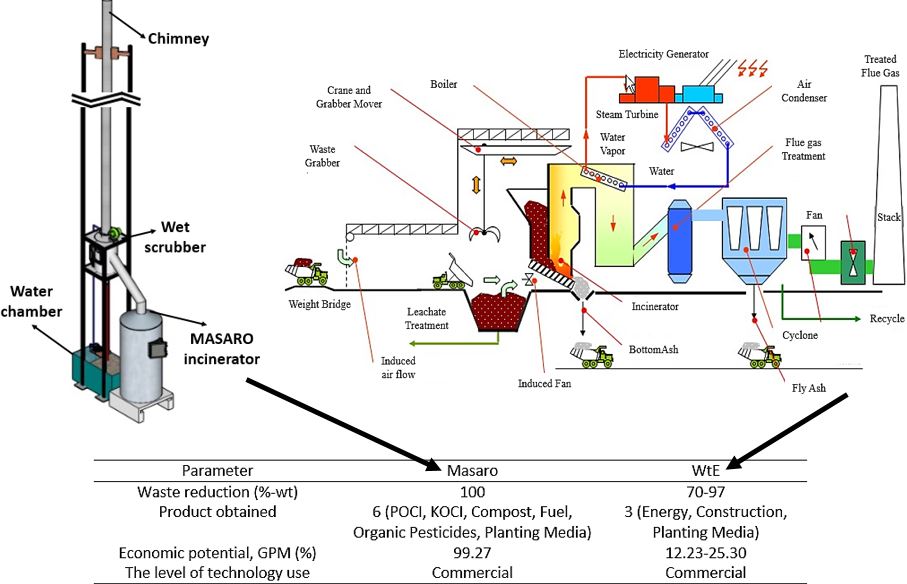Performance Comparison of Waste Management Approach in West Java through Masaro and Waste-to-Energy (WtE) Power Plant Technologies
Abstract
Waste is often considered as something useless and valueless. However, as the world enters a new industrial era, there is a growing awareness that waste has a high economic value. With proper processing, the waste can be recycled and even used as a feedstock for power generators. With a waste production reaching 24,000 tons per day in West Java, waste becomes a sustainable raw material. There are several methods for processing waste, such as Zero Waste Management Technology (Masaro) and Waste-to-Energy Power Plant (WtE). This study aims to compare the performance of Masaro and WtE technologies from their potential and economic impact. Both methods certainly have their advantages and disadvantages in terms of waste reduction capacities, products obtained, and financial benefits. This study reveals that Masaro technology can reduce 100% waste, whereas WtE can only reduce up to 70–97%. Subsequently, Masaro technology offers more diverse products rather than WtE (6 products vs. 3 products). Moreover, the gross profit margin (GPM) shows that Masaro can reach 99.27% while WtE is still in the range of 12.23–25.30%. It can be concluded that Masaro has quite higher potential and economic benefits compared to WtE.
Full text article
References
Abidin, A. Z., Bramantyo, H., Baroroh, M. K., & Egiyawati, C. (2021). Circular Economy on Organic Waste Management with MASARO Technology. IOP Conference Series: Materials Science and Engineering, 1143(1), 012051. https://doi.org/10.1088/1757-899X/1143/1/012051
Abidin, A. Z., Choliq, N. S., Yemensia, E. V., & Hastuti, R. (2020). Study on Environmental Health Aspect of Plastic Refinery in MASARO Cirebon Unit in Indonesia. 4th International Conference on Green Energy and Applications (ICGEA), 116–120. https://doi.org/10.1109/ICGEA49367.2020.239716
Abidin, A. Z., Yemensia, E. V., Wijaya, K. W., & Rahardjo, A. P. (2021). Circular Economy on Non-Biodegradable Waste Management with MASARO Technology. IOP Conference Series: Materials Science and Engineering, 1143(1), 012052. https://doi.org/10.1088/1757-899X/1143/1/012052
Azis, M. M., Kristanto, J., & Purnomo, C. W. (2021). A Techno-Economic Evaluation of Municipal Solid Waste (MSW) Conversion to Energy in Indonesia. Sustainability, 13(13), 7232. https://doi.org/10.3390/su13137232
Febijanto, I., Steven, S., Nadirah, N., Bahua, H., Shoiful, A., Dewanti, D. P., Kristyawan, I. P. A., Haris, K. A., Yuliani, M., Hanif, M., Robbani, M. H., Yusuf, N. R., Prihartanto, Alfatri, P., Pratama, R. A., Purwanta, W., Wiharja, Nugroho, R., & Ramadhan, S. K. (2024). Municipal solid waste (MSW) reduction through incineration for electricity purposes and its environmental performance: A case study in Bantargebang, West Java, Indonesia. Evergreen, 11(1).
Institut Teknologi Bandung. (2021). Pengelolaan Sampah Organik dengan Metode Masaro ITB. In Media Indonesia Rubrik Rekacipta ITB. Media Indonesia Rubrik Rekacipta ITB.
Li, C., Gillum, C., Toupin, K., & Donaldson, B. (2015). Biomass boiler energy conversion system analysis with the aid of exergy-based methods. Energy Conversion and Management, 103, 665–673. https://doi.org/http://dx.doi.org/10.1016/j.enconman.2015.07.014
Maagøe, V. (2023). Barriers of Waste-to-Energy and how to address them Batam – Indonesia. In The Danish Energy Agency & The Danish Environmental Protection Agency.
Martin, J. J. E., Koralewska, R., & Wohlleben, A. (2015). Advanced solutions in combustion-based WtE technologies. Waste Management, 37, 147–156. https://doi.org/10.1016/j.wasman.2014.08.026
Purwanta, W., Augustine, T., Octivia, R., Fani, A. M., & Rifai, A. (2022). Study of circular economy potential in the Bantargebang waste-to-energy plant. IOP Conference Series: Earth and Environmental Science, 1017, 012031.
Purwanta, W., Prawisudha, P., Juangsa, F. B., Fani, A. M., & Philander, E. (2022). Modular incinerator with pre-treatment plant for municipal solid waste treatment in the super-priority tourism destination of Labuan Bajo Indonesia. IOP Conference Series: Earth and Environmental Science, 1065(1), 012030. https://doi.org/10.1088/1755-1315/1065/1/012030
Sipilä, K. (2016). Cogeneration, biomass, waste to energy and industrial waste heat for district heating. In Advanced District Heating and Cooling (DHC) Systems (pp. 45–73). https://doi.org/10.1016/B978-1-78242-374-4.00003-3
Sistem Informasi Pengelolaan Sampah Nasional. (2023). Waste pile amount in West Java. In KemenLHK. https://sipsn.menlhk.go.id/sipsn/public/data/timbulan
Steven, S., Hernowo, P., Restiawaty, E., Irawan, A., Rasrendra, C. B., Riza, A., & Bindar, Y. (2022). Thermodynamics Simulation Performance of Rice Husk Combustion with a Realistic Decomposition Approach on the Devolatilization Stage. Waste and Biomass Valorization, 13(5), 2735–2747. https://doi.org/10.1007/s12649-021-01657-x
Steven, S., Restiawaty, E., & Bindar, Y. (2023). A Simulation Study on Rice Husk to Electricity and Silica Mini-Plant: From Organic Rankine Cycle (ORC) Study to its Business and Investment plan. Waste and Biomass Valorization, 14(5), 1787–1797. https://doi.org/10.1007/s12649-022-01957-w
Winanti, W. S., Purwanta, W., & Wiharja. (2022). Utilization of municipal solid waste into electricity energy: A performance of PLTSa Bantargebang pilot project. IOP Conference Series: Earth and Environmental Science, 1034(1), 012003. https://doi.org/10.1088/1755-1315/1034/1/012003
Yemensia, E. V., Steven, S., Soekotjo, E. S. A., & Abidin, A. Z. (2023). Prospect and application of flue gas washing liquid from wet scrubber unit at Masaro plastic refinery for organic pesticides. IOP Conference Series: Earth and Environmental Science, 1268(1), 012040. https://doi.org/10.1088/1755-1315/1268/1/012040
Yuliani, M., Otivriyanti, G., Yusuf, N. R., Fani, A. M., & Purwanta, W. (2022). A Techno-Economic Study on the Application of Waste-to-Energy Incinerator in Indonesia (Case on City “X”). Jurnal Teknologi Lingkungan, 23(2), 126–134. https://doi.org/10.29122/jtl.v23i2.5302
Authors
Authors who publish with this journal agree to the following terms:
- Authors retain copyright and grant the journal right of first publication with the work simultaneously licensed under a Creative Commons Attribution License that allows others to share the work with an acknowledgement of the work's authorship and initial publication in this journal.
- Authors are able to enter into separate, additional contractual arrangements for the non-exclusive distribution of the journal's published version of the work (e.g., post it to an institutional repository or publish it in a book), with an acknowledgement of its initial publication in this journal.
- Authors are permitted and encouraged to post their work online (e.g., in institutional repositories or on their website) prior to and during the submission process, as it can lead to productive exchanges, as well as earlier and greater citation of published work (See The Effect of Open Access).





